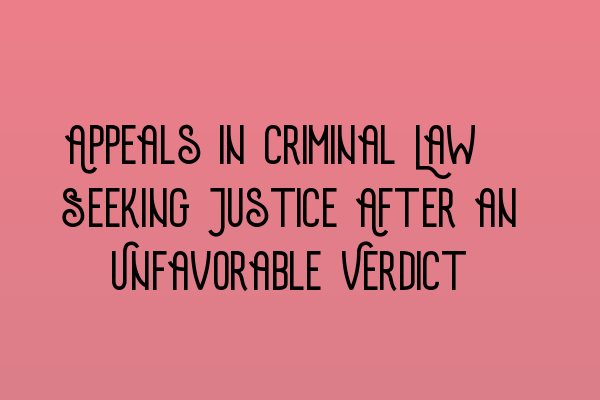Appeals in Criminal Law: Seeking Justice After an Unfavorable Verdict
When a criminal case reaches an unfavorable verdict, it can be a devastating experience for the accused and their loved ones. The impact of such a decision can have long-lasting consequences on their personal and professional lives. However, it is essential to remember that an unfavorable verdict is not necessarily the end of the road. The legal system allows for appeals, which provide a glimmer of hope for justice to prevail.
Understanding Appeals in Criminal Law
An appeal is a legal process that allows a convicted individual to challenge their conviction or sentence in a higher court. It is crucial to note that an appeal is not a retrial; instead, it focuses on identifying errors or legal issues that occurred during the original trial. The key objective of an appeal is to seek a reversal of the previous decision or to request a new trial.
Grounds for Appeal
There are several grounds on which a criminal appeal can be based. Some common grounds include:
- Procedural errors: If there were significant procedural errors during the trial that may have affected the fairness of the proceedings, it can be grounds for an appeal.
- Legal errors: If there were errors in the interpretation or application of the law during the trial, it can be a valid ground for appeal.
- New evidence: If new evidence emerges after the trial that could have a substantial impact on the outcome, it can be a basis for an appeal.
- Prosecutorial misconduct: If the prosecution engaged in unethical or illegal conduct during the trial that could have influenced the verdict, it can be grounds for appeal.
The Appeals Process
The appeals process can vary depending on the jurisdiction and the specific circumstances of the case. However, in most criminal appeals, the following general steps are involved:
- Filing a Notice of Appeal: The first step is to file a notice of appeal within the prescribed time limit. It is crucial to adhere to the deadlines, as failure to do so may result in the appeal being dismissed.
- Preparing the Appeal Record: The appeal record consists of all the relevant documents from the original trial, including transcripts, exhibits, and court orders. It is essential to compile a comprehensive, organized, and well-structured record to support the appeal.
- Written Submissions: Both parties involved in the appeal, namely the appellant and the respondent, have an opportunity to submit written arguments outlining their respective positions. These submissions must address the legal issues raised in the appeal and provide persuasive arguments to support their claims.
- Oral Arguments: In some cases, the appellate court may grant permission for oral arguments. This allows the parties to present their case before a panel of judges, who may ask questions and seek clarifications on various aspects of the appeal.
- Appeal Decision: After considering all the submissions and arguments, the appellate court will render its decision. The court may choose to uphold the original decision, reverse it, or order a new trial.
The Importance of Legal Representation
When it comes to criminal appeals, having competent legal representation is crucial. Experienced solicitors who specialize in criminal law understand the intricacies of the appeals process and can navigate through the complexities effectively. They can assess the merits of the case, identify potential grounds for appeal, and develop persuasive arguments to present before the appellate court.
If you are considering filing an appeal in a criminal case, reach out to SQE Criminal Law & Practice Law UK for expert advice and guidance. Our team of solicitors is well-versed in criminal appeals and can provide you with the representation you need to seek justice.
For additional resources on SQE preparation and exam dates, check out the following related articles:
- SQE 1 Practice Exam Questions
- SQE 1 Practice Mocks FLK1 FLK2
- SQE 2 Preparation Courses
- SQE 1 Preparation Courses
- SRA SQE Exam Dates
Remember, seeking justice through an appeal is an option worth exploring. Don’t lose hope if you’ve received an unfavorable verdict. Contact SQE Criminal Law & Practice Law UK today to discuss your case and understand the possibilities.
